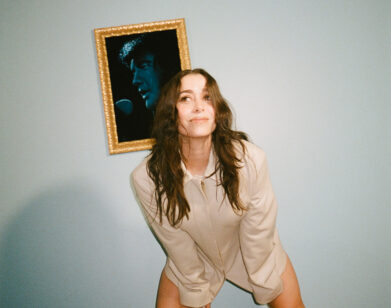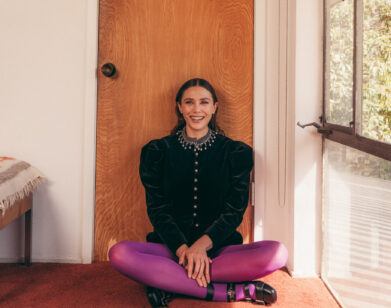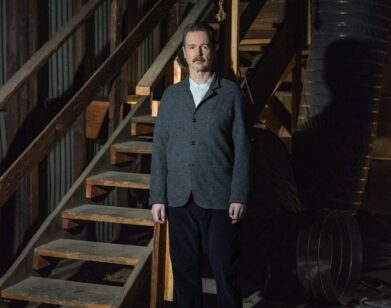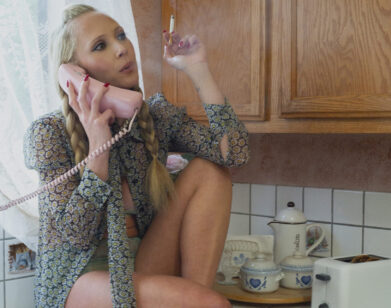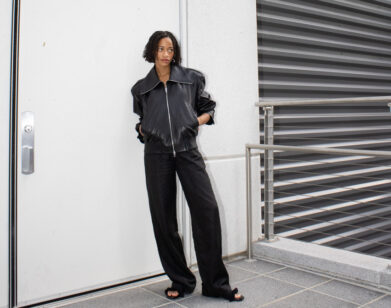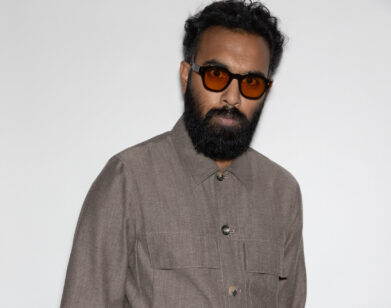Discovery: Annika Marks
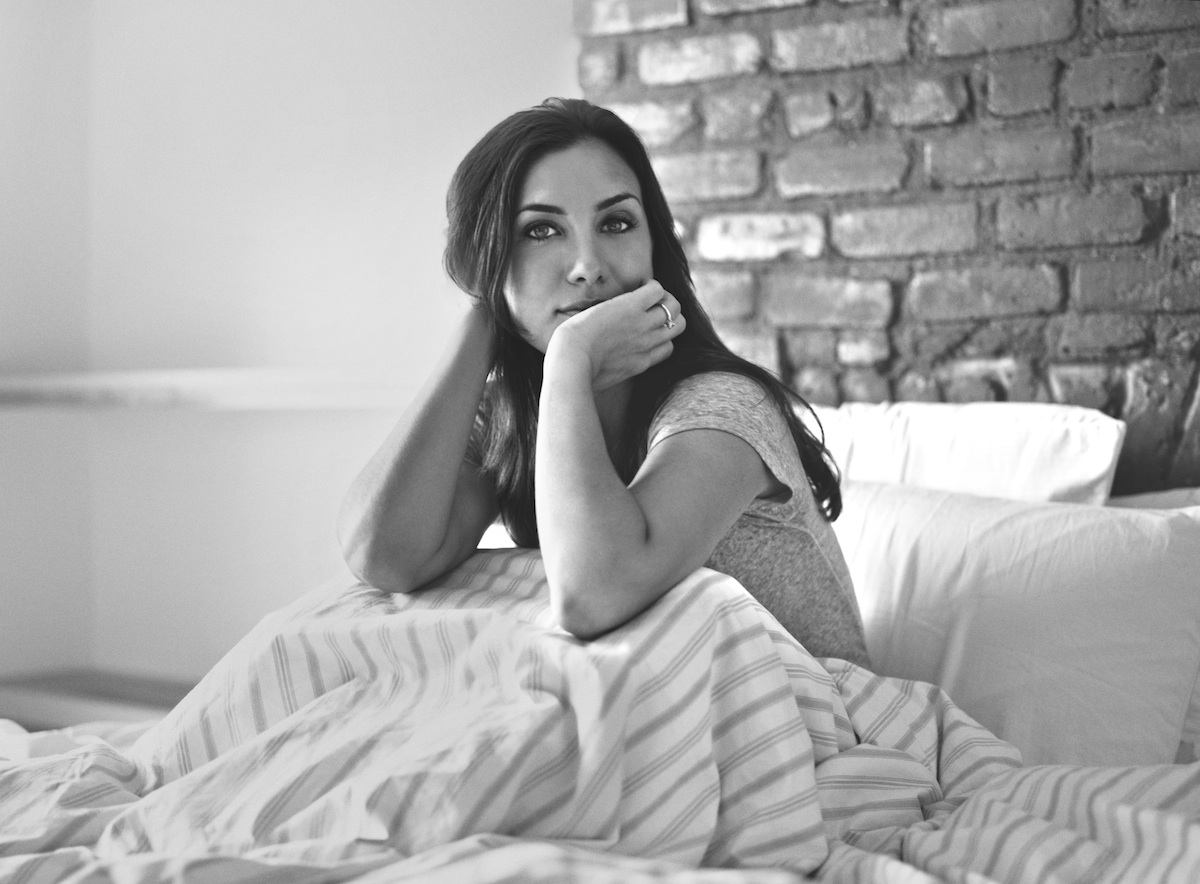
No role in The Sessions could have been easy to play. Actor John Hawkes was tasked with embodying Mark O’Brien, a real-life polio survivor confined almost all the time to an iron lung—a role that requires physical contortion as well as the humor and grace Hawkes finds in it. And Helen Hunt, as the sex surrogate Hawkes hires to help him lose his virginity, must be every bit as open, compassionate, and comfortable in her body as her own real-life analogue, Cheryl Cohen Greene.
For up-and-coming actress Annika Marks, though, the challenge was a little different: her character, Amanda, isn’t based on any one person so much as on a combination of the nurses and caretakers who helped O’Brien throughout his life. He developed attachments to many of these women, which are distilled in the film into a singular focus on Amanda, whom he tells he loves when she takes him out shirt shopping. Amanda, a college student, can’t love Mark the way he loves her; there’s too much she wants to do, and she can’t be literally grounded by a severely disabled boyfriend. But rejecting Mark isn’t easy, either—she truly grows to love him, too, in her own way. It’s a credit to Marks, whose career to this point has mostly been in theater, that she’s able to find the subtleties in her character: she portrays Amanda as a conflicted, whole human being even as she’s Mark’s fantasy. Though she’s not onscreen for much of the film, it’s more than enough to make an impression.
HOMETOWN: Seattle, WA
CURRENT CITY: Los Angeles, CA
DOUBLE THREAT: We moved a lot when I was growing up, and I always, actually, wanted to be a dancer. I focused on ballet through my childhood, and then as a teenager went to a summer program in Seattle where they also focused on acting. I got inspired to redirect my creative interest into acting and never looked back. Once I got interested in acting, I never really could even consider a career in dance again. If I could sing, I would have considered musical theater, but nobody wants to pay to hear me sing. [laughs]
HOME LIFE: My dad is a physician and my mom always ran his laboratory, so they’re scientists, but they always kind of made me feel like science and the arts are sort of one and the same—it’s just a different way of expressing, you know, seeing the world differently. They were always super-supportive, and they’re big lovers of the arts, we always had season tickets to theaters growing up. I never got any resistance from them at all—I think they were a little bit afraid, as they should have been, when I left for New York saying, “I’m gonna be an actress,” but they never made me feel like they were anything but totally 100 percent behind me.
AFTER SCHOOL: I had some friends who kind of walked out of theater school and right into a great agency, and that did not happen for me at all. I really struggled trying to figure out just what the business of acting looked like. I don’t think I’d ever been a good networker or any of that stuff, so I was just sort of waiting for somebody to find me, which is not the way it works.
MEMORABLE ODD JOBS: I was a nanny, I was babysitting, I waited tables, I took hostessing jobs, I did all sorts of temp jobs and office work. I was that person scouring Craigslist, you know. I got people’s e-mails in clubs—that was the most absurd job, I was sitting at a club all night with a pad of paper asking for e-mails. [laughs] The most amazing party I worked that way was for a friend who threw a party for models; it was called the White Party. I’m 5’4″ on a good day, and it was all these six-feet-tall Amazonian men and women all dressed in white; and I was this little midget girl, like 18 years old, dressed in black because I thought it was more flattering, walking around like basically at crotch level with all of these models asking for e-mails. [laughs]
STAGE TO SCREEN AND BACK AGAIN: I’ve learned to really love film, and there’s a real luxury in film—like when you realize you can whisper to somebody and that can be captured. It’s such an exciting thing to start exploring that at this point I really do want both of those things. I still do a lot of theater, and I hope that forever as hopefully my career continues to grow in film it’ll just translate into the world of theater and I’ll be able to do bigger and better roles with bigger and better theaters. I really am happiest on stage, and I can’t imagine it ever not being home base.
THE SESSIONS‘ AMANDA AS AMALGAM: There was a woman who Mark fell really deeply in love with named Tracey—so there is that real person out there, but that’s just one example. There were lots of caretakers of Mark that he fell in love with and projected his own desires onto over the years. Since it’s a film, and [writer/director Ben Lewin] wanted to tell that story in a single person, he used lots of different examples where Mark had fallen in love people over the years, and tried to make them into this single character. The difference with Tracey is that she also really cared for him, and he was something of an emotional crutch for her, and so I read a lot about what he wrote about her and tried to draw on that in playing Amanda. I think that they had a somewhat codependent emotional bond that was very confusing for Mark, but it was also a really genuine affection they had for each other.
PLAYING A CRUSH OBJECT: There is something about knowing you are this person’s fantasy, and that means that there is something slightly heightened about the way this person sees you. There’s almost a freedom in that; it releases you from the bonds of trying to emulate an exact experience that this real person had with another real person and it lets you just have fun. I’d look at the way John would look at me or the way Mark was looking at Amanda—it feels like if you live in your head like that, then those fantasies must be that much more colorful and dynamic and engaging, and so I actually felt like I had quite a bit of freedom in playing her that way.
ON JOHN HAWKES: He is extraordinary—he’s obviously an amazing actor, but he’s just as amazing of a person. He just is incredibly humble and grateful to be working on good material. He’s the kind of actor that learns everybody’s name the first time he hears it. And I think that when the lead actor on set is that way, then everybody shows up and attempts to be as good and genuine as their sort of leader on this ship. And Ben Lewin, the director, is the exact same way, so it was an incredibly warm set—nobody had the right to be anything other than warm when those two people were so wonderful to work with.
FINDING SYMPATHY IN AMANDA: I know what it feels like to break somebody’s heart, and it’s awful. I’ve always said I think it’s worse to be on that side of things, emotionally. It’s a devastating feeling, because you don’t break somebody’s heart that you don’t care about—you only do that to somebody you do care about, otherwise the stakes would be much lower. So that wasn’t difficult, to tap into that feeling of guilt. And I don’t think things are nearly as black-and-white as we like to imagine them being, like you date a whole bunch of people that you think are totally wrong for you and then you find one that’s totally right. You also make choices and people can be right for you in so many ways but wrong for you in a couple, and it could sort of rule them out. I don’t think that’s easy. I decided when I read this character that it was just too simple to make her just a heartbreaker.
John and Ben and I sort of agreed to raise the stakes and treat it like a love story that cannot be, which seemed like a more interesting story to tell then just somebody that wasn’t interested. And I felt like it was important to pay Mark the respect that he was a truly lovable person, that he wasn’t an easy person to say no to, and I thought it also would send Mark on his journey in the film in a way that said, “You’ve been acknowledged and you have been loved.” As much as this hurts, it also has to be encouraging that somebody feels conflicted about you.
THE SESSIONS IS OUT IN LIMITED RELEASE TODAY.

